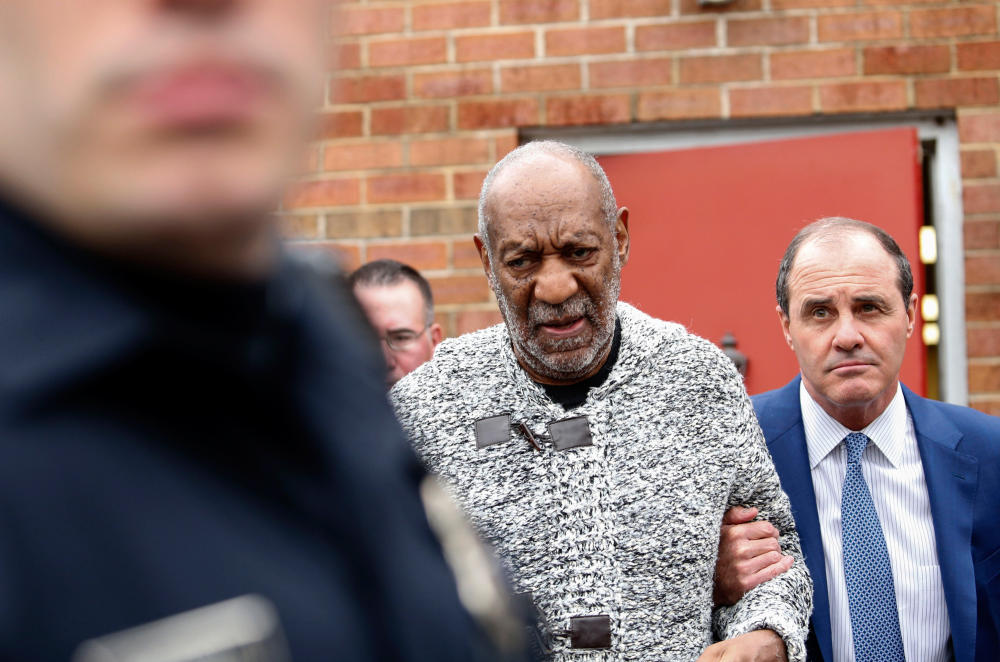Narrowly beating a statute of limitations deadline to file charges, prosecutors in Pennsylvania announced felony sexual assault charges against comedian Bill Cosby on Wednesday. A former Temple University employee says Cosby drugged and assaulted her in January of 2004.
Montgomery County, Pa., prosecutors have charged Cosby with three counts of aggravated indecent assault. The charges against him are second-degree felonies.
“These charges stem from a sexual assault,” according to prosecutor Kevin Steele, who said the assault occurred at Cosby’s house in Cheltenham, a Montgomery County township that’s just outside Philadelphia.
Steele urged any other victims to contact his office.
Update at 2:40 p.m. ET: Victim’s Lawyer Issues Statement
Attorneys for the woman who says she was abused have issued a statement thanking the district attorney’s office and police, adding that because the case is ongoing, they won’t comment further.
Update at 2:50 p.m. ET: Cosby’s Bail Set At $1 Million
Cosby was arraigned on the sex assault charge Wednesday afternoon, and his bail set at $1 million.
Bobby Allyn, from member station WHYY, reports that Cosby has been ordered to turn over his passport and to have no contact with his accuser. The preliminary hearing has been scheduled for January.
Our original post continues:
Over the past year, Cosby has been accused of sexually abusing dozens of women. Cosby has denied those charges, and earlier this month, he filed lawsuits against seven of his accusers, saying they had made up the claims to extract money from him.
When NPR’s Scott Simon asked Cosby about the allegations against him during a November 2014 interview, the comedian refused to respond, shaking his head in silence.
Pennsylvania has a 12-year statute of limitations on felony sex crimes, meaning prosecutors had until January to bring charges against Cosby, 78.
Under state law, aggravated indecent assault has a range of definitions, from having sexual contact with a person without their consent to doing so after an attacker has “substantially impaired the complainant’s power to appraise or control his or her conduct by administering or employing, without the knowledge of the complainant, drugs, intoxicants or other means for the purpose of preventing resistance.”
After the Temple employee, Andrea Constand, accused Cosby of sexually assaulting her in 2004, a Montgomery County prosecutor decided in 2005 that charges weren’t warranted in the case. But that prosecutor lost his re-election bid last month to Steele, who made pursuing charges against Cosby an issue in his campaign.
On Wednesday, Steele outlined a timeline of events in 2004, saying Cosby established a friendship with the victim and then made sexual advances that were rejected. After that, Cosby urged her to take pills and drink wine, Steele said.
According to the criminal complaint filed Wednesday, Constand “considered Cosby, thirty-seven years her senior, to be a mentor, and described instances in which he invited her to his home for dinner, invited her to restaurants, invited her to events, introduced her to people, and provided her with guidance and career advice.”
The 2005 investigation into Cosby led to a deposition in which Cosby admitted that he had, as the Two-Way reported, “obtained the sedative Quaalude with the intent of giving the drug to women with whom he wanted to have sex, and he acknowledged giving it to at least one woman.”
That testimony became public this past summer, prompting new calls for charges against Cosby. Announcing the charges Wednesday, Steele said the decision was made after “new information” came to light in July.
Cosby gave his deposition in the course of a civil trial, before he and Constand reached a settlement over her lawsuit against him.
As part of their deal, the two sides signed a confidentiality agreement — but the records were unsealed at the request of the Associated Press, in part because the judge in the case said he regarded Cosby as something of a public servant who can be expected to forfeit some privacy protections, as Eyder reported for the Two-Way.
We’ll note that while NPR doesn’t usually identify people who say they’re the victims of sexual assault, we’ve done so in this case, because Constand has taken a public stand on the case.
9(MDA3MTA1NDEyMDEyOTkyNTU3NzQ2ZGYwZg004))
